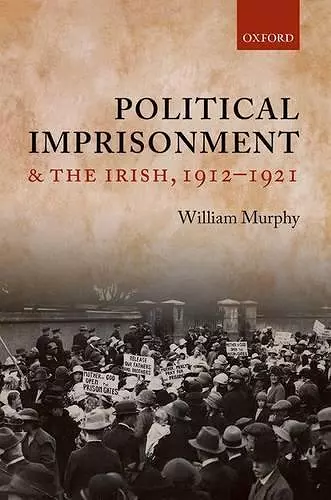Political Imprisonment and the Irish, 1912-1921
Format:Hardback
Publisher:Oxford University Press
Published:6th Mar '14
Currently unavailable, and unfortunately no date known when it will be back
This hardback is available in another edition too:
- Paperback£36.49(9780198784555)

For a revolutionary generation of Irishmen and Irishwomen - including suffragettes, labour activists, and nationalists - imprisonment became a common experience. In the years 1912-1921, thousands were arrested and held in civil prisons or in internment camps in Ireland and Britain. The state's intent was to repress dissent, but instead, the prisons and camps became a focus of radical challenge to the legitimacy and durability of the status quo. Some of these prisons and prisoners are famous: Terence MacSwiney and Thomas Ashe occupy a central position in the prison martyrology of Irish republican culture, and Kilmainham Gaol has become one of the most popular tourist sites in Dublin. In spite of this, a comprehensive history of political imprisonment focused on these years does not exist. In Imprisonment and the Irish, 1912-1921, William Murphy attempts to provide such a history. He seeks to detail what it was like to be a political prisoner; how it smelled, tasted, and felt. More than that, the volume demonstrates that understanding political imprisonment of this period is one of the keys to understanding the Irish revolution. Murphy argues that the politics of imprisonment and the prison conflicts analysed here reflected and affected the rhythms of the revolution, and this volume not only reconstructs and assesses the various experiences and actions of the prisoners, but those of their families, communities, and political movements, as well as the attitudes and reactions of the state and those charged with managing the prisoners.
Political Imprissonment in Ireland marks the appearance of a significant publication relating to Ireland's revolutionary decade. This is the first comprehensive study of political imprisonment in the years 1912 to 1921, when 6,129 men and women were either interned or imprisoned as a result of the unrest in the country in the aftermath of the 1916 rebellion and subsequent War of Independence. * Maria Luddy, History Today *
Murphy provides a well-written and meticulously researched account of Irish imprisonment... an important study of a central facet of modern Irish history that will undoubtedly pave the way for closer analysis * Ian Miller, Irish Studies Review *
a well-written, direct, concise, engaging, and enjoyable study, neither disappointingly simplistic nor needlessly esoteric. It is accessible to new students of the period and specialists alike. The original research is extremely impressive and renders the work a valuable contribution to prison studies and studies of the Irish revolution while it is simultaneously a great sample of history written from below. * Nicholas A. Stark, H-Net Humanities and Social Sciences Online *
This is a well-written and tightly-argued book. Murphy lays out his evidence clearly and carefully, yet gives readers an accessible and engaging text. His analysis of the Irish prison administration is first-class and is an important addition to the literature. * John Borgonovo, Studia Hibernica *
This is a landmark study on the subject and will be a benchmark by which subsequent work in this area is judged. * James Loughlin, American Historical Review *
William Murphy's monograph is an exciting and necessary scholarly addition. Meticulously researched, broadly considered, and nuanced in interpretation, Murphy's book convincingly argues for the need to move beyond the public arena and instead to examine the period through the usually hidden "prism" of the prison. * Laura McAtackney, Journal of British Studies *
Murphy offers the first comprehensive history of a decade during which political prisoners ... effectively turned the apparatus of state control into a site of active revolution ... [the book makes] important contributions to political and social history ... bring[s] to light hitherto neglected perspectives on the ordinary activists, paramilitaries and prisoners and their families and communities who experienced and contributed to a decade of monumental change. * Gemma Clark, Social History *
Drawing on a wide range of archival sources, manuscripts, contemporary publications, memoirs, and secondary literature, Murphy provides a social and cultural history of political imprisonment. This is a welcome approach, moving the focus away from previous research on political developments surrounding certain prisons and individuals ... [a] well-written and easy to read book. * Dieter Reinisch, Saoirse - Irish Freedom *
[Murphy's] work is detailed, and complements well the existing literature ... a formidable and sensitive study of the 'Irish felon' * Marc Mulholland, English Historical Review *
a closely detailed, subtly nuanced study of a penal system placed under severe, almost intolerable, strain by increasingly organised protests by prisoners demanding political status ... his account does much to illuminate the gradual poisoning of the political atmosphere. * Charles Townshend, Irish Historical Studies *
With its comprehensive scholarly apparatus, this book will provide great assistance to all its readers ... this is first-rate scholarship, working on material of unvarying interest. * Sean McConville, The Historian *
William Murphy has produced the most complete study to date of the experiences of Irish political prisoners. Beginning with the treatment meted out to suffragettess, Murphy takes us with great skill through the different phases of government policy towards republican prisoners, through hunger strikes and escapes. Political Imprisonment and the Irish, 1912-1921 will be the definitive account for some time to come. * Brian Hanley, Irish Economic and Social History *
Drawing on a wide and disparate range of sources (including governmen documents, newspapers, personal letters and first-hand accounts gleaned from diaries and memoirs), Murphy skilfully sets out how imprisonment was both a common experience for those involved in political agitation in Ireland at the time and how it was, simultaneously, one of the key strategies of the state in dealing with resistance to its authority. Throughout Murphy writes with great clarity and demonstates extraordinary rigor in his use of primary sources. * Richard McMahon, Comparative Legal History *
ISBN: 9780199569076
Dimensions: 237mm x 162mm x 25mm
Weight: 630g
314 pages